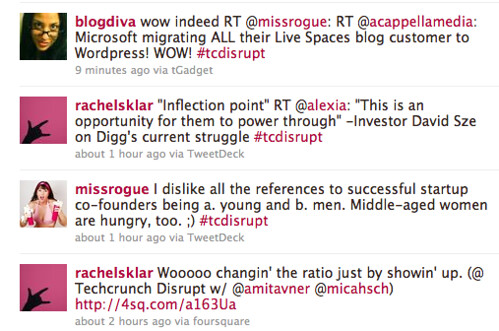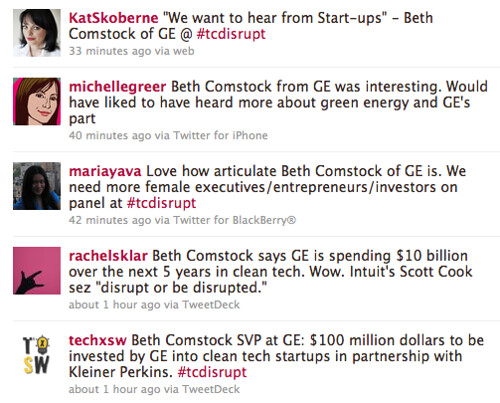The third wave embraces contradictions and conflict, and accommodates diversity and change.
— Rosemarie Tong, Feminist Thought: A More Comprehensive Introduction
The web site for the TechCrunch Disrupt conference in San Francisco this week credits venture capitalist John Doerr with coining the term “third wave” when Charlie interviewed him at the first Disrupt earlier this year. John’s not talking about third wave feminism, of course, but the “innovations taking place with social, mobile and commerce platforms and applications”. In either case it’s hard to argue with Erick’s conclusion on TechCrunch that a panel with John and his partner Bing interviewing Mark of Zynga (TechCrunch’s CEO of the year) is the perfect start for #TCDisrupt.
John’s known for his 2008 quote about the pattern he sees correlated with success: white, male, nerds who have dropped out of prestigious schools and have no social skills. Michael Arrington’s overwhelmingly-white, overwhelmingly-male, preview The Agenda of Awesome also features the author of The Diversity Myth.and the founder of a social network that’s been described as one of the most sexist sites on the internet.
Awesome.
As well as shameless plugs by and for conference participants, the main news on TechCrunch this last week has been “Angelgate”. Kara Swisher of BoomTown nicely characterizes it as a “manly hissy fit amongst a passel of white dudes”: a circle-jerk of mutual promotion sparked by Michael’s allegation of collusion by angel investors and “leaked” emails being published.  Guess where? Meanwhile conference sponsors Google and Intuit have just admitted to collusion with other valley icons including Intel and Apple.
All in all it’s a vivid snapshot of the clubby overwhelmingly-white, overwhelmingly-male network of technologists, bloggers, and investors who have been in the driver’s seat in Silicon Valley for a while now.
 But the time’s they are a-changing.
But the time’s they are a-changing.
As Allyson Kapin pointed out in last week’s Women Who Tech telesummit, women in technology have made a huge amount of progress storming the clubhouse this last year. J’ame Ohm, winner of this weekend’s Disrupt Hackathon is a great example. The all-female panel Tuesday morning discussing women in technology is another.
Fretting, asking, and begging isn’t a plan descries the kerfuffle that led to the panel. Shira Ovide’s Wall Street Journal article quoted Rachel Sklar of Mediaite and Change the Ratio on the conference’s “overwhelming maleness”. Michael responded sharply with Too Few Women In Tech? Stop Blaming The Men. Or at least stop blaming me. Hilarity ensued.
Rachel is on the panel, along with web marketing strategist Michelle Greer, who took the lead (and the brunt of abuse) in the comments in the TechCrunch discussion. They’re joined by Lauren Leto of Bnter, Leila Chirayath Janah of Samasource, Sara Chipps of Girl Developer, and Cyan Banister of Zivity, who Michael’s quoted as saying “women [stink] as entrepreneurs a lot of the time because they are nurturing and not risk-taking enough by nature”. Alas, as Zennie Abraham points out on SF Gate, there aren’t any blacks or Latinas on the panel, at least not yet.* Still, it’s a very good step, potentially analogous to Lynn d Johnson’s 2005 SXSW panel on Blogging While Black, and it should be an interesting range of perspectives.
Between now and then there are all-white guy male sessions on topics like building internet gems, power, the future of venture capital, consumerization of enterprise, and design vs. engineering. Because, y’know, what could women possibly have to say about any of those subjects? Oh, and Beth Comstock of GE is speaking about Cultures of Collaboration. Hopefully she’ll cover the value of diverse teams and an inclusive environment.
White guys are allowed to talk about diversity too, and it’ll be interesting to see whether any of them do. With women in the majority on most social network sites, avid use of Twitter in the Black and Latin@ communities, and statastics showing what women-led high-tech startups have lower failure rates than those led by men, it seems a mighty important topic for the Silicon Valley elite (and the startups battling it out for $50,000 and the Disrupt Cup) to discuss.
Continued in part 2, Changing the ratio
* or the rest of the conference, as far as I can tell. It looks to me like rapper/CEO Chamillionaire might once again be the only black speaker; see Shireen Mitchell’s perspective on this.








 More news! Under intense grilling by TechCrunch’s Sarah Lacy, Facebook board member Peter Thiel says Facebook is undervalued at $30 billion, compared Facebook CEO Mark to Apple CEO Steve of the all-white-male executive staff. He also said that as long as Mark stays at Facebook, the company will be about building new products rather than making current ones work, satisfying customers, addressing security, or giving people privacy.
More news! Under intense grilling by TechCrunch’s Sarah Lacy, Facebook board member Peter Thiel says Facebook is undervalued at $30 billion, compared Facebook CEO Mark to Apple CEO Steve of the all-white-male executive staff. He also said that as long as Mark stays at Facebook, the company will be about building new products rather than making current ones work, satisfying customers, addressing security, or giving people privacy.  It’s lunchtime now. Here’s a recent Twazzup snapshot of Twitter influencers, with Adria Richards of But You’re a Girl topping the list.
It’s lunchtime now. Here’s a recent Twazzup snapshot of Twitter influencers, with Adria Richards of But You’re a Girl topping the list.
Leave a Reply